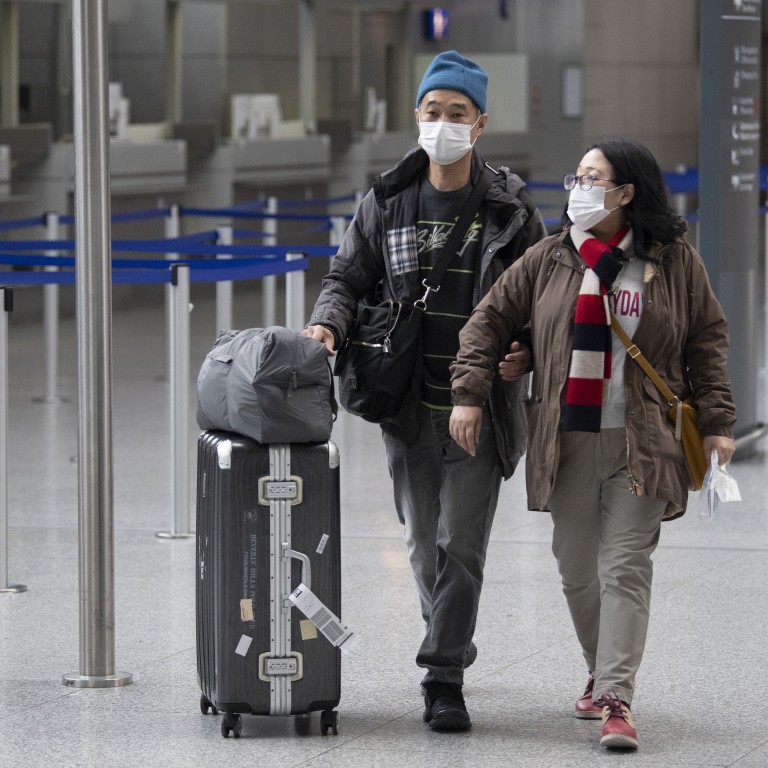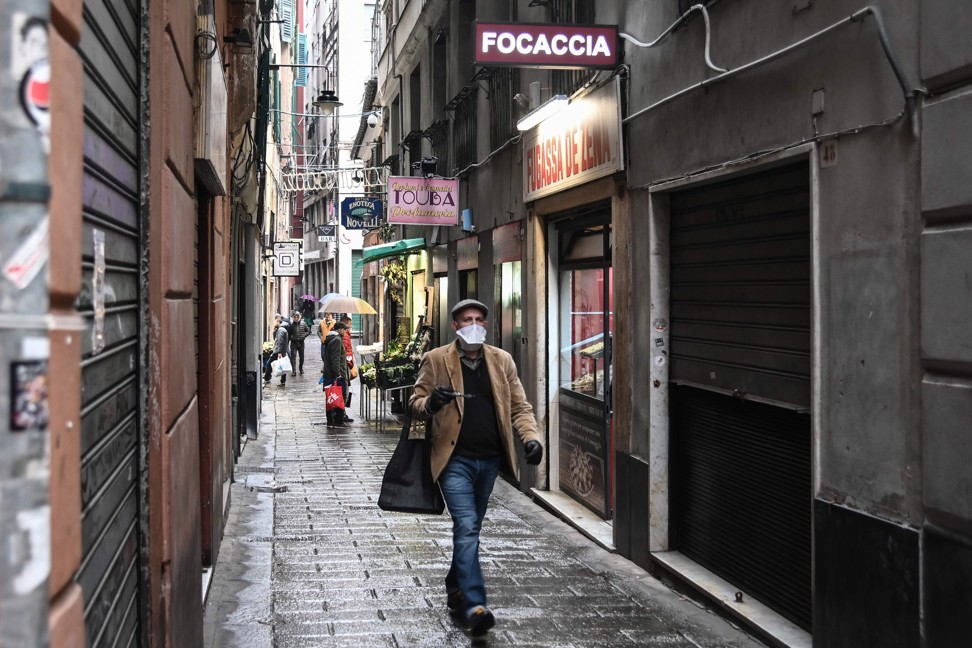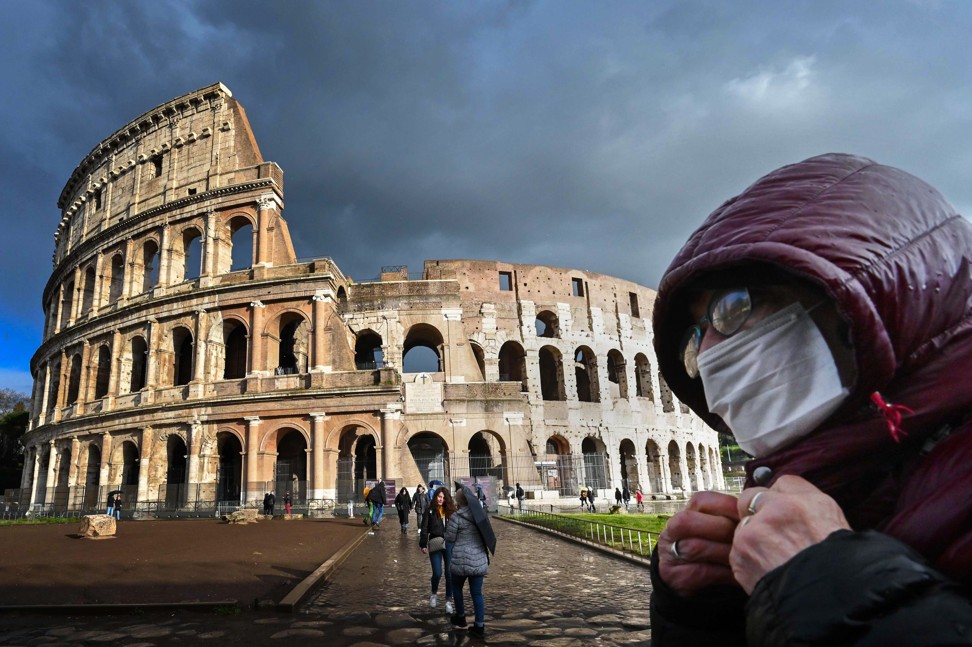
Coronavirus: Hong Kong imposes quarantine restrictions on 26 European countries in Schengen zone
- Travellers arriving from Schengen border-free travel region including Hong Kong residents will be required to self-quarantine for two weeks
- Move comes as city records six more confirmed cases, with 16-month-old infant among them
Hong Kong will dramatically expand quarantine restrictions to cover nearly all arrivals from Europe as it takes unprecedented action to stop the coronavirus being brought in from a continent that is fast becoming the new flashpoint of the pandemic after China.
The government issued a statement at night, confirming an earlier report by the Post, to announce a red travel alert for countries including France, Germany, Belgium, Spain, Switzerland and Sweden “in view of the persistent and rapid increase in the number of Covid-19 cases in Europe”.
Anyone arriving from the Schengen region, which has a combined population of more than 420 million, will have to undergo a mandatory self-quarantine for 14 days, starting from next Tuesday.

Those arriving from the Emilia-Romagna, Lombardy and Veneto regions of Italy – the worst-hit country after China – face mandatory quarantine in government camps.
In addition, between Friday midnight and next Tuesday, all arrivals from the Bourgogne-Franche-Comte and Grand Est regions in France, North Rhine-Westphalia in Germany, and La Rioja, Madrid and Basque Country in Spain, will be self-quarantined, not confined at government facilities as announced last Tuesday. The same applies to arrivals from Hokkaido in Japan.
Restrictions for Hongkongers returning from South Korea will be revised so that arrivals from Daegu and Gyeongsangbuk-do have to undergo confinement at government camps for 14 days. Other Hong Kong returnees from the country can opt for self-quarantine.
The government statement also noted rising infections in Britain and the US, and urged Hongkongers there, especially students planning to return home for holidays, to head back as soon as possible.
The coronavirus outbreak has left more than 5,000 dead around the world and infected over 135,000. Europe has reported more than 22,000 cases and over 1,000 deaths.
Hong Kong’s move to restrict travel from Europe came a day after US President Donald Trump announced he would close his country’s borders to the Schengen region for a month.
The city has confirmed 137 cases so far, one of the latest being a 16-month-old boy – the city’s youngest Covid-19 patient who has been hospitalised with a mild fever.
The toddler’s 66-year-old maternal grandfather, who is asymptomatic and had no recent travel history, was also confirmed with the virus on Friday.
Among the other new cases reported were a 67-year-old businessman who had visited Britain in late February and early March, and a 30-year-old woman who had travelled in Europe.
Meanwhile, the Hospital Authority confirmed that an elderly man, the city’s 89th Covid-19 patient, had died at Pamela Youde Nethersole Eastern Hospital in Chai Wan.
He was the husband of a confirmed patient who had visited a Buddhist temple in North Point that has been linked to 19 local infections.
The bedridden pensioner, whose condition became critical on Thursday, lived in Maylun Apartments, near the temple.
Coronavirus: Why did China’s multimillion-dollar early warning system fail?
“He suffered from chronic diseases including hypertension and had a record of strokes. He also suffered from polio,” said Dr Lau Ka-hin, the authority’s chief manager of quality and standards.
The patient’s oxygen level fell on March 6 and his condition fluctuated after that until it deteriorated rapidly on Friday morning, Lau said.
In the toddler’s case, his parents were earlier both confirmed as infected with the virus after the family returned from London on a Cathay Pacific flight on February 29.
The boy was admitted to Princess Margaret Hospital in Kwai Chung on Thursday with a runny nose, a day after his father was sent there.
China’s first confirmed Covid-19 case traced back to November 17
He was in a stable condition and had a slight fever, and was only given Panadol, Lau said.
Dr Chuang Shuk-kwan, of the Centre for Health Protection, earlier said children usually developed only mild symptoms.

“I’m not too worried, because according to reports in other places, children and adolescents – they may be infected, but it seems the symptoms are very mild,” Chuang said.
“In case the baby is confirmed [infected], I think the symptoms will continue to be very mild.”
The businessman who tested positive had travelled to Britain between February 27 and March 8 before returning home on Cathay Pacific flight CX250 in first class. He attended a meeting at a North Point office, before being hospitalised with cold symptoms on March 10.
The woman whose infection was confirmed visited Greece from February 10 to 26, and spent time in London before heading to Paris from February 27 to March 5. She returned to Hong Kong via Turkish Airlines flights TK1828 and TK70 in business class on March 5, then felt unwell three days later after going hiking.
Another man, 61, and a 54-year-old woman were also confirmed to be infected on Friday. The woman had travelled to France and Morocco between February 13 and March 8, before flying back to Hong Kong via Amsterdam. She developed a cough on March 6 and attended a clinic in Hong Kong on March 12.
The man had been to the US state of Colorado between February 27 and March 9 and returned to Hong Kong via Tokyo on March 10.



